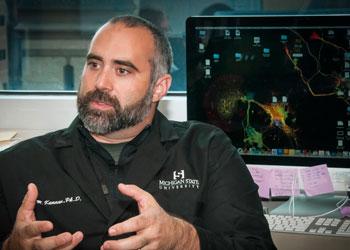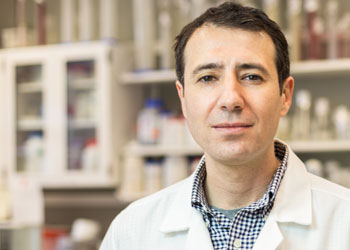Private Donations Fuel MSU Biomedical Research
MSU College of Medicine's and Alzheimer’s disease researcher Nicholas Kanaan, PhD, refers to his work as “team- based research,” relying not only on the scientists, but the government agencies and private donors willing to fund their work.
October 10, 2014
A grant that Michigan State University researcher Nicholas Kanaan recently received from the National Institutes of Health is a major boost to his study of what causes Alzheimer’s disease, but equally important were earlier private donations.
Without that private support, he likely would not have been able to gather the data necessary to rise above the tough competition for NIH grants, said Kanaan, an assistant professor in the College of Human Medicine. As federal funding for medical studies has declined and competition for grants has increased, researchers are relying more on donations from foundations and individual philanthropists to support their work until they can successfully compete for government funding.
“In some cases, research can come to a standstill without that kind of funding,” Kanaan said. “We need that extra support to help us get over that hurdle. I think the private funding we’ve gotten has been critical to our success.”
He was especially grateful to the Jean P. Schultz Biomedical Research Endowment for keeping his Alzheimer’s research going while he waited for NIH funding. Since its founding, the endowment has supported the work of MSU researchers studying cancer, but recently decided to broaden its scope into other diseases.
“We provide funding to people like Nick (Kanaan) who have very encouraging results,” said Bob Schultz, an MSU graduate who created the endowment in memory of his wife, who died of cancer in 1988.
Schultz, the retired vice-chairman of General Motors, called the grants “just-in-time funding,” enabling research on the brink of major breakthroughs to continue until it can attract larger grants from government agencies.
“Our objective is to help them get the data necessary to enhance their chances of getting the big prize,” he said. “If we can help one of these guys or gals to do this key research to get the government funding, that fits in with our family’s goal.”
The grant Kanaan received from the Jean P. Schultz Biomedical Research Endowment allowed him to continue studying the role a brain protein called tau plays in the development of Alzheimer’s. As a result of that research, the National Institute on Aging, a division of the National Institutes of Health, awarded Kanaan a so-called R01 grant, one of the largest funding opportunities it gives to individual researchers. The $1.8 million grant will allow Kanaan’s Grand Rapids-based laboratory to continue the study over the next five years.
Tau is found in all neurons of healthy brains, although researchers have long suspected that when the protein becomes defective, it can cause Alzheimer’s. Kanaan’s research focuses on exactly how tau may contribute to causing the disease.




